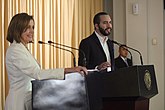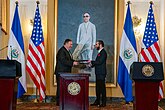
Salvadoran Americans
Salvadoran Americans (Spanish: salvadoreño-estadounidenses or estadounidenses de origen salvadoreño) are Americans of full or partial Salvadoran descent. As of 2021, there are 2,473,947 Salvadoran Americans in the United States,[2] the third-largest Hispanic community by nation of ancestry. According to the Census Bureau, in 2021 Salvadorans made up 4.0% of the total Hispanic population in the United States.[3]
Salvadorans are the largest group of Central Americans of the Central American Isthmus community in the U.S.
The largest Salvadoran populations are in the metropolitan areas of Los Angeles and Washington, D.C., which have been established since the 1970s and currently number in the hundreds of thousands, as well as other Central Americans such as Guatemalan and Honduran Americans.[4]
Salvadorans are concentrated in California (32% of the nationwide Salvadoran population), Texas (15%), Maryland (8%) and New York (8%).[5]
Language[edit]
In the U.S., Salvadorans speak both English and Spanish, but their use varies. Recent immigrants and older generations tend to speak Spanish exclusively, while the newer generations (descendants of immigrants) learn Spanish as a first language only to become fluent in English when they start school. According to the American Community Survey of 2004, 5.2 percent of Salvadorans only speak English at home, the lowest compared to other immigrant populations. The percentage of “non-English at home, English spoken “very well” is at 36.2, the third lowest after the Guatemalans and the Hondurans.
Salvadoran Spanish is one of the most common dialects of Spanish spoken in the United States. Salvadorans speak Spanish that makes use of the medieval voseo pronoun equivalent to thou, making them the largest voseo Spanish speakers in the country. This is commonly shown in the usage of the Spanish word "vos" as opposed to the usual "tú." While not a unique characteristic to Salvadoran Spanish, the use of "vos" is a major difference between Salvadoran Spanish and Mexican Spanish.[23] In Washington D.C., Salvadoran Spanish is the most common dialect of Spanish spoken, while in Los Angeles, Salvadoran Spanish is the second-most common Spanish dialect, after Mexican Spanish. Salvadoran Spanish consists of many Native American/Indigenous words from the Lenca and Pipil language that survived the European conquest and rule of El Salvador.
In the study, Voseo to Tuteo Accommodation Among Two Salvadoran Communities in the United States by Travis Doug Sorenson, Sorenson compared two Salvadoran communities, Houston and Washington, D.C., on the way they maintain the use of voseo in the U.S. where the tuteo form is most widely spoken.[24] His research found that while Salvadorans are the majority of the Latin American population in Washington, D.C., they use the voseo form as much as their counterparts in Houston; a city with a large Mexican population that used the tuteo form instead. The hypothesis that Salvadorans participants in Washington would significantly retain more voseo than their compatriots in Houston was wrong.[24]
Religious affiliation[edit]
Reflecting the country's namesake, most Salvadorans are Christian. Traditionally, Salvadorans are Roman Catholics, but since the civil war, there has been a notable increase of Evangelicals or other Protestant denominations in the country. There is also a small but vibrant Jewish community, and most of its members are business owners.[25][26] Some Salvadoran Americans converted to Mormonism or Jehovah Witness. Younger generations of Salvadoran Americans are less likely to practice any type of religion than their parents.
During the civil war, some members of El Salvador's small, but vibrant Jewish community immigrated to the United States,[27] mostly settling in the Miami and Los Angeles areas.
Salvadoran North Americans relations with El Salvador[edit]
Most Salvadoran born in the U.S. are not active in or outspoken about Salvadoran politics. Those U.S. organizations most actively involved in Salvadoran politics (such as the Committee in Solidarity with the People of El Salvador, CISPES) have attracted little participation by Salvadoran North Americans themselves. The immigrants' own organizations have focused not on politics at home, but on relief and jobs in immigrant communities throughout the United States. This relative indifference to home politics may be surprising, given the political passions that have long raged in El Salvador; but the majority of Salvadoran North Americans seem interested in putting the hatred of the past behind them.
In the 1980s several Central American solidarity organizations were created in an effort to claim their status as Salvadorans and aid those in the mainland. In 2009 groups like CISPES and SHARE who were mainly Salvadoran organizations rallied with the Nicaragua Network and other Nicaraguan organizations to speak out against the coup in Nicaragua at the time. Organizations like CISPES, the Salvadoran American National Association (SANA), Farabundo Martí National Liberation Front (FMLN), and others have been continuously working to establish transnational ties with El Salvador since the 1980s. Amid the 2004 Salvadoran presidential elections, the right-wing ARENA candidate Tony Sacas received backing from the U.S. Republican party.[78] The Republican party threatened to prevent remittances sent for families in El Salvador from Salvadorans in the U.S. to arrive.[78] In 2004 the number of remittances received to El Salvador was about $2 billion, as of 2017 it's more than $5 billion.[78][79] In 2009, SANA reached out to Salvadoran organizations in Washington to aid in the call for the U.S. government to stay neutral amid the elections in El Salvador.[78] This pressure from the large Salvadoran population in Washington and surrounding states, eventually even won the support of two congressmen, Howard Berman (D-California) and Raúl Grijalva (D-Arizona).[78]
While the most ideologically committed of the Salvadoran refugees settled in Panama, Nicaragua, Costa Rica, Australia or Canada, those who settled in the United States focused on survival and building a community. Refugees who fled the government and refugees who fled the guerrillas have a lot in common; many will not even discuss their political beliefs, lest it disrupt the fragile solidarity of the refugee community. Furthermore, many Salvadorans on the left became active in politics because of the desperate poverty and class war in El Salvador; when they arrived in the United States, where it seemed for the first time possible to escape poverty through hard work, their political commitment sometimes melted away.
Salvadorans outside El Salvador are not permitted to cast absentee ballots in that country's elections. The majority of the refugee community is thought to favor the left, and the absence of their votes is believed to have helped the right-wing party ARENA win the Salvadoran presidency in 1989 and 1994.[80]
The relative lack of political influence among Salvadoran Americans is not necessarily permanent. Salvadoran immigrants are densely concentrated in a few cities, and they have a strong infrastructure in refugee organizations. As more Salvadorans become U.S. citizens, the immigrant community will probably play a larger role in local and regional politics. And given their economic contribution, they will almost certainly come to exert more influence in El Salvador.
The history of U.S.-El Salvador relations encompasses some controversial moves and operations by the United States, e.g. the U.S.-involvement in the Salvadoran Civil War[81] and interference in Salvadoran elections such as during the 2004 presidential election.[82]
President Obama and President Funes announced the U.S.-El Salvador Partnership for Growth during President Obama's March 2011 visit to El Salvador. El Salvador is one of four countries—-along with the Philippines, Ghana and Tanzania—-with which the United States is undertaking this partnership. The Partnership began with an analysis by economic experts from both countries, which identified the two key binding constraints to growth in El Salvador as crime and insecurity, as well as low productivity in the tradables sector. Based on this assessment, the U.S. government worked closely with the Government of El Salvador to identify and prioritize key activities that would address those constraints to growth and unlock El Salvador's economic potential. The activities are outlined in a Joint Country Action Plan that will steer the partnership moving forward.
The recent 2009 elections resulted in the election of the leftist Farabundo Martí National Liberation Front (FMLN) party over the ARENA party that had been in power since 1992. ARENA supporters argued that the victory of FMLN would result in retaliation from the United States and lead to political reforms similar to those in Hugo Chávez's Venezuela despite the U.S. official neutral position. An Obama visit to El Salvador symbolized its acceptance of the new government and show to other Latin American countries that it will maintain strong ties despite the change of regime. The shift from ARENA to FMLN does symbolize the growing disenchantment of the Salvadoran population with Washington foreign policy.
Despite this shift, El Salvador has not decided to become more self-reliant. The economic development it experienced by following the Washington Consensus was worth the cost of economic reforms because it was able to access the American market and compete in the global market. Therefore, the Obama visit validated the stability within El Salvador in the transition from ARENA to FMLN and showed other countries in the region the benefits of following the Washington Consensus. Obama's visit was in order to strengthen America's position in Central America and show that countries that follow liberalization reforms enjoy stronger ties with the United States.
El Salvador's accommodation on economic and militia demand also meant that the United States would provide more benefits to Salvadorans living within the United States; Salvadorans have been eligible to receive TPS (Temporary Protection Status) since 1990. TPS has allowed Salvadorans to obtain work permits as well as protection from deportation. There are approximately 2 million Salvadorans live in the United States, making it the sixth largest ethnic group in the United States. Such a large number of Salvadorans means that they have the capacity to send money back to El Salvador, which would make a very large contribution to its economy. Salvadorans have been essential in rebuilding El Salvador's economy as shown in 2002 where it was reported that these migrants had sent $2 billion annually in remittances.[15]
Remittances from the United States make El Salvador more dependent on the United States support for Salvadorans living there. Thus, it is imperative that El Salvador maintains strong political ties with the American government because of its dependence on remittances. Remittances account for twenty percent of El Salvador's Gross Domestic Product (GDP), which makes the economic ties with the United States even more important. Salvadorans who reside in the United States benefit as well from El Salvador's accommodation as exemplified by the American government's consistent extension of the TPS.
El Salvador has lobbied successfully for those extensions because of the strong ties that have been forged. United States-El Salvador relations have been a reciprocal relationship in which El Salvador has gained much more than if it were to have chosen a resistance strategy. Thus, President Obama's choice to stop in El Salvador exemplifies to the Salvadoran community in the United States that they have nothing to fear with the change of political parties.
The special relationship developed between the United States and El Salvador in the past 20 years has differentiated El Salvador from its neighboring Central American countries. Despite the high level of violence, El Salvador has transformed itself into a stable democracy and a success story in economic development.
U.S.-Salvadoran relations remain close and strong. U.S. policy towards the country promotes the strengthening of El Salvador's democratic institutions, rule of law, judicial reform, and civilian police; national reconciliation and reconstruction; and economic opportunity and growth. El Salvador has been a committed member of the coalition of nations fighting against terrorism and has sent 10 rotations of troops to Iraq to support Operation Iraqi Freedom.
On August 26, 2011, Ambassador Mari Carmen Aponte joined Salvadoran Minister of Defense David Munguía Payés in a formal send-off ceremony for 22 Salvadoran troops who will deploy to Afghanistan on August 28. The 22 troops will serve as instructor trainers within NATO Training Mission – Afghanistan (NTM-A). Specifically, 9 Air Force Trainers will work with the Afghan Air Units in Herat, 3 Military Police Trainers will work with the Afghan Police Academy in Kabul, and 10 Counter-Insurgency Instructors will operate throughout Afghanistan, training military and police units as part of 6 Mobile Training Teams.
Salvadoran troops have earned a reputation as an effective and professional military force for their participation in international humanitarian missions to Lebanon, Liberia, Côte d'Ivoire, Sudan and Haiti. El Salvador's Cuscatlán Battalion also served with distinction during 11 rotations in support of humanitarian and reconstruction activities in Iraq. This latest deployment will mark El Salvador's first participation in the NATO mission to Afghanistan.
U.S. ties to El Salvador are dynamic and growing. More than 19,000 American citizens live and work full-time in El Salvador. Most are private businesspersons and their families, but a small number of American citizen retirees have been drawn to El Salvador by favorable tax conditions. The Embassy's consular section provides a full range of citizenship services to this community. The American Chamber of Commerce in El Salvador is located at World Trade Center, Torre 2, local No. 308, 89 Av. Nte. Col. Escalón.
Principal U.S. officials include:
The U.S. Embassy in El Salvador is located in Antiguo Cuscatlán.



